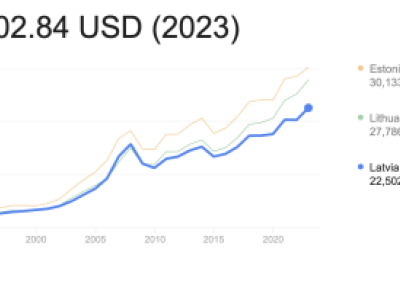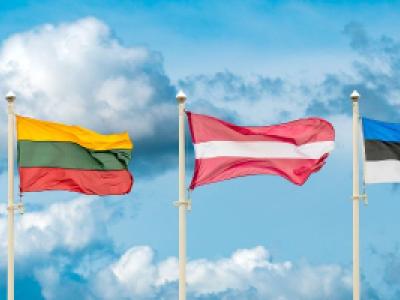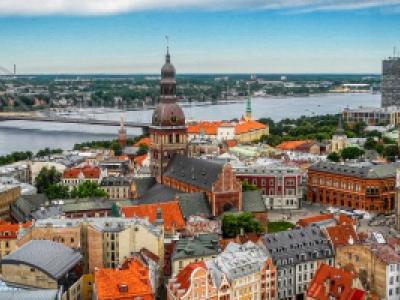Last year I red an excellent article pointing out that income level in Estonia could reach level its in Scandinavia in next 10-15 years. Although this article made me smile, I decided to compare - is it real for Estonia to reach level like that?
Since its almost a year since I wrote that article - I decided to compare again and see how Estonia is doing in it's already 9-14 years plan to reach that level.
In my measurements I'm using raw data for GDP, GDP per capita, I could use minimum wage as an indicator as well, but since there is not set a government minimum wage in Scandinavia, it would be harder to compare. Although there is a minimum wage in Estonia - and in 2014 it was set to EUR 355/ USD 480
Let's start with definition - what is Nordic countries?
According to Wikipedia - Nordic countries are:
The Nordic countries are a geographical and cultural region in Northern Europe and the North Atlantic. It consists of five countries (Denmark, Finland, Iceland, Norway and Sweden) as well as their autonomous regions (the Åland Islands, the Faroe Islands and Greenland).
For sake of the ease of this measurement experiment for next 9-14 years - I will stick with: Denmark, Finland, Iceland, Norway and Sweden
As I wrote in 2013 - I'm not sure which countries Estonian masterminds counted as Nordic countries.
GDP Estonia & Nordic Countries
| GDP 2012 (bln) | GDP 2013 (bln) | Growth (bln) | Change (%) | |
| Denmark | 315.164 | 330.813 | 15.649 | 4.73% |
| Finland | 247.143 | 256.842 | 9.699 | 3.77% |
| Iceland | 13.586 | 14.619 | 1.033 | 7.06% |
| Norway | 500.029 | 512.580 | 12.551 | 2.44% |
| Sweden | 523.941 | 557.938 | 33.997 | 6.09% |
| Estonia | 22.376 | 24.476 | 2.1 | 8.57% |
Nordic countries and Estonia GDP $ Nominal 2013 (data source: World Bank)
As we can see from table above - indeed Estonia experienced highest GDP growth (8.57%) compared to other Nordic countries.
Since every country experienced pretty impressive GDP growth - I would say for now this -
Estonia is situated close to Nordic countries (and I believe Nordic capital has over flooded Estonian market) - Estonia's high GDP growth can be explained with high GDP growth in rest of Nordic countries. I'm sure, in coming years, if recession will happen in some or many Nordic countries - it will affect Estonia's GDP growth as well. For now I would say - for Estonia to have GDP growth positive - Nordic countries should be at minimum 2% growth.
Two of the biggest Estonia's partners are from Nordic countries - Sweden (6.09% GDP growth) and Finland (3.77% GDP growth)
2013 - seems was a good year for Nordic countries, and Estonia managed to trade with them and finish year 2013 with 8.57% GDP growth.
GDP per Capita Estonia And Nordic countries
| 2012 ($t) | 2013 ($t) | Growth ($t) | Change (%) | |
| Denmark | 56.364 | 58.930 | 2.566 | 4.34% |
| Finland | 45.649 | 47.219 | 1.570 | 3.32% |
| Iceland | 42.362 | 45.263 | 2.902 | 6.84% |
| Norway | 99.636 | 100.819 | 1.183 | 1.18% |
| Sweden | 55.039 | 58.164 | 3.125 | 5.37% |
| Estonia | 16.887 | 18.478 | 1.591 | 8.61% |
Nordic countries and Estonia GDP per capita $ Nominal 2013 (data source: World Bank)
About Income Levels
Today I found an interesting article on Helsinki Times - where we can learn a little about income level in Finland, according to HT:
International comparisons typically concentrate on the average or median income of full-time employees, which at the end of 2012 in Finland were 3,206 (man) and 2,853(woman) euros respectively.
Source (Räty overlooked hundreds of thousands of Finns)
Again, I have no clue, what is a Nordic Country by standards of Estonian Economists, maybe they counted just Finland? Because of their closer ties?
OK, now we have some estimate data about income level in Finland, now lets see what is an average income level in Estonia?
According to Estonian National Bureau of Statistics, average monthly gross wage in March 2014 in Estonia were 1003 euros what is a 5.8 growth compared to previous (2013) period.
I would say - not bad, but now lets take a look to Finland's average salary data, count them together (there is inequality for salaries in Finland, men gets more) (3,206+2,853)/2= 3,029 euros
So, right now Estonia stay behind Finland for about 2000 euros. And in next 9-14 years is going to catch up.
It would mean to raise average salaries for 222 euros per year (if 9 years) or 142 euros (if 14 years) and hopping that in next 9-14 years average salary will stay stood in Finland and other Nordic countries.
Estonia - I'm watching you!



